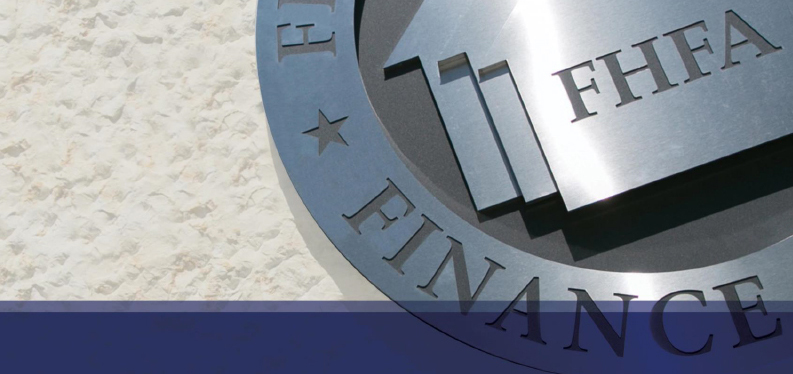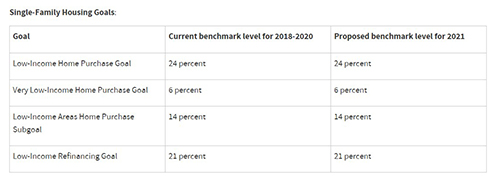
MBA Urges FHFA to Extend Current GSE Affordable Housing Goals

The Mortgage Bankers Association, in a letter this week to the Federal Housing Finance Agency, said FHFA should extend current affordable housing goals for Fannie Mae and Freddie Mac, given current economic uncertainty.
“With respect to the 2021 Enterprise housing goals proposed by FHFA, MBA believes it is appropriate to maintain the current requirements for another year given the high level of economic uncertainty,” MBA wrote. “The COVID-19 pandemic and resulting disruption to the U.S. economy has created an environment in which there are many hopeful—yet potentially very different—pathways and timelines to economic recovery.”
FHFA would appear to agree. In July, FHFA proposed 2021 Housing Goals for Fannie Mae and Freddie Mac (https://www.fhfa.gov/Media/PublicAffairs/Pages/FHFA-Proposes-2021-Housing-Goals-for-Fannie-Mae-and-Freddie-Mac.aspx). In a break from policy, FHFA issued proposed goals for 2021 only, instead of a three-year period through 2023, citing “economic certainty related to the coronavirus pandemic.”
The proposed rule would establish both single-family and multifamily goals, unchanged from the previous benchmark levels from 2018-2020:


In MBA’s comments, MBA Senior Vice President of Commercial/Multifamily Policy and Member Engagement Mike Flood and MBA Senior Vice President of Residential Policy and Member Engagement Pete Mills told FHFA Director Mark Calabria the GSE housing goals “are an important component of the framework by which FHFA can measure the Enterprises’ progress.”
“MBA strongly supports efforts to ensure sustainable and affordable housing for low-income and very low-income households, whether through homeownership or rental housing,” the letter said. “While the Enterprise housing goals can and do contribute to this objective, they should be balanced with and accompanied by other tools and objectives. The most effective goals will be those that include both specific, quantitative targets based on purchased loans that serve distinct borrower/market segments and qualitative efforts such as outreach, research, and other targeted initiatives. These differing types of goals should be pursued in tandem and should complement each other.”
MBA said it supported keeping the 2021 goals at current benchmarks. The policy uncertainty faced by federal and state lawmakers and regulators is daunting, and any responses put in place surely will impact the single-family and multifamily mortgage markets,” the letter said. “In addition to the uncertainty regarding these policy responses, other factors such as employment trends, consumer behavior and broader market dynamics are particularly difficult to forecast in the current environment. Allowing an additional year to collect data and observe the path of the market recovery will provide a better picture of the impact of the economic downturn on all consumers, and particularly the impact on low- to very low-income borrowers. MBA supports such an approach by FHFA.”
However, MBA expressed concern with FHFA language suggesting while the proposed 2021 benchmark multifamily housing goals are unchanged from those in place in 2020, the final rule ultimately could specify otherwise.
“If FHFA does determine to depart from the proposal, MBA would urge FHFA also to provide an opportunity for public notice and comment on the changes,” MBA said. “Looking further ahead, we urge FHFA to begin to move to a singular approach to supervising the Enterprises’ multifamily affordable housing performance that does not depend on the continuation of FHFA’s role as conservator.”
MBA also noted that as FHFA maintains discretion with respect to its treatment of an Enterprise that fails to meet one or more housing goals, in light of the actions taken by the Enterprises to facilitate forbearance and to implement new loss mitigation procedures in response to the COVID-19 pandemic, and because many of these actions are likely to disproportionately benefit lower-income households, MBA believes it is appropriate for FHFA to consider such factors when evaluating the Enterprises.
“Pandemic response measures should not be viewed as a substitute for efforts to meet the housing goals, nor should they excuse substantial shortfalls in the Enterprises’ results,” MBA said. “Such measures instead should be viewed as one component of the Enterprises’ broader efforts to facilitate and preserve affordable housing options nationwide. When determining whether to require an Enterprise to submit a housing plan for failure to meet one or more 2021 housing goals, FHFA should analyze that Enterprise’s pandemic response measures with a focus on how those measures specifically aided lower-income households.”
